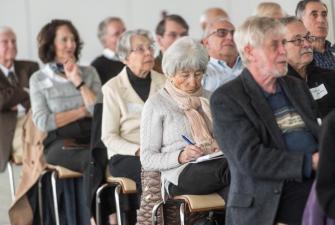Upcoming Events

Film Group January 27, 2021
Series Eleven – Filmed Intellectuals
The films can be screened via the Kanopy streaming site of the Vancouver Public Library
Zoom discussions of each film will take place on: Jan. 27, Feb. 24 and Mar. 31 at 4pm
Hosted by John LeBlanc
Series Eleven: Films featuring intellectuals face serious difficulties in presenting such complex and unique individuals in a medium that often relies on formulaic structures within its standard two hour limit. Film director Margarethe von Trotta, has addressed this problem by attempting to engage intimately with her subjects, requiring that she identify to some degree with them (for example, as a woman railing against male oppression) as well as trying to discover the real person through their letters, close associates and places they inhabited. The two hour time limit also requires identifying a representative moment in the individual’s life. These three films, all by women directors, feature, in the first two films, internationally known intellectuals and, in the third film, a fictional thinker, offering an additional difficulty of creating what a contemporary intellectual might look like. All three films share a focus on intellectuals as figures of exile, not only mental because of their advanced ideas but also physical, suffering displacement that shows they are not merely mind but also flesh and blood.
Jan. 27 - Hannah Arendt (2012) – directed by Margarethe von Trotta - is part of a trilogy of films by her on prominent women intellectuals, also including films about Rosa Luxembourg and Hildegard von Bingen. Von Trotta presents the life of this key 20th century intellectual (played, as in the other films of the trilogy, by German actor Barbara Sukowa) by focusing on her contentious response to the Adolph Eichmann trial in Jerusalem. A Reform German Jew, Arendt was forced into exile to France then the US by the rise of Nazism. Her attack on Zionism, crystalized in her Eichmann trial reports and book, made her a pariah of her own Jewish people and her conservative personal life has placed her outside of feminism.
Council Meeting - February 10
The Council will meet online.
Wednesday, 10 February 2021 - 10:30am to 12:30pm
Senior Scholars' Series - February 11
Childbirth for Grandparents: Childbirth as a Metaphor
Michael Klein
Professor Emeritus of Family Practice Medicine and Pediatrics (2003)
Michael C. Klein, MD, CM, CCFP, FCFP, FAAP (neonatal/perinatal), FCPS, is emeritus professor of family practice at the University of British Columbia, adjunct professor of family medicine at McGill University and senior scientist emeritus at the Child and Family Research Institute in Vancouver.
As a researcher, he is best known for his landmark study of episiotomy, demonstrating that it caused the very trauma that it was supposed to prevent, which is credited with contributing to a large drop in routine episiotomy use and a concurrent fall in maternal birth trauma. He teaches at UBC in family practice and midwifery and is a long-time member of the editorial board of Birth and a member of the Board of Canadian Doctors for Medicare.
He was head of a McGill teaching centre and the Department of Family Medicine at the Jewish General Hospital, a McGill teaching hospital in Montreal for seventeen years, and head of the Department of Family Practice at Children’s and Women’s Hospitals in Vancouver for ten years.
He is a recipient of the Order of Canada, Award for Lifetime Contributions to Primary Care Research from the North American Primary Care Research Group, Family Medicine Researcher of the Year Award from the College of Family Physicians of Canada, the Founders Award from DONA International, the annual research award from Lamaze International and the Lifetime Achievement Award in Family Medicine Research from the College of Family Physicians of Canada. He and his wife, Bonnie, emigrated from the US to Canada in 1967 because he refused to be a military physician during the Vietnam War. His son, Seth, and daughter, Naomi, were born, raised and work in Canada. Bonnie is a filmmaker, writer and disability rights activist.

Jerry Wasserman - moderator
Professor Emeritus of English and Theatre (2017)
Jerry Wasserman retired in 2016 after 44 years teaching at UBC. Jerry is also an actor and theatre critic with Lifetime Achievement awards from the Canadian Association for Theatre Research and the Greater Vancouver Professional Theatre Association. He is a member of the BC Entertainment Hall of Fame.
Co-sponsors: Emeritus College and Green College
Thursday, 11 February 2021 - 5:00pm to 6:30pm
General Meeting February 17, 2021
PROSPECTS FOR INTERNATIONAL POLITICS AFTER TRUMP
The last four years have seen many of the norms of international politics disrupted by the outgoing American administration. What are the prospects for the future: a return to the status quo ante, more of the same, or the emergence of a new set of dynamics governing world politics? And how do Canada and Canada-US relations fit into this changing world?
In a discussion moderated by Professor Emeritus Ken Carty (Political Science), Professors Richard Price and Allen Sens (Political Science) will address these questions, considering the shape of international relations in the next decade and questions of security, conflict, and the future of NATO.

Allen Sens (PhD, Queen’s) specializes in international relations, with a research and teaching focus on international security. He has a particular interest in armed conflict and conflict management, especially peace
operations, nuclear weapons and arms control, European security, and Canadian foreign and defence policy.

Richard Price (PhD, Cornell) specializes in international relations. His research interests focus on the role of norms in world politics, particularly norms limiting warfare; constructivist international relations theory; normative international relations theory; the politics of international law; and ethics in world politics.
Time line
1:30pm Business Meeting
1:45pm Panel: Prospects for International Politics after Trump: Richard Price & Alan Sens
2:30pm Q&A
3:00pm End of Meeting

Travel Group February 18, 2021
Beverley Green and Paul Steinbok will talk about their individual experiences with cruising in the Galapagos. Beverley was on the National Geographic "Endeavor II,” a luxury expedition ship with a maximum of 95 guests. She did the Eastern Galapagos circuit, while Paul was on the Coral 2, a luxury yacht with 12 passengers, which did the Western Galapagos circuit.
If you are currently not on the email list of the EC travel interest group and wish to receive our mailings, please contact Paul Steinbok at psteinbok@cw.bc.ca.
A zoom link will be sent out 2 days before each meeting.
Thursday, 18 February 2021 - 4:00pm
Film Group February 24, 2021
Series Eleven – Filmed Intellectuals
The films can be screened via the Kanopy streaming site of the Vancouver Public Library
Zoom discussions of each film will take place on: Jan. 27, Feb. 24 and Mar. 31 at 4pm
Hosted by John LeBlanc
Series Eleven: Films featuring intellectuals face serious difficulties in presenting such complex and unique individuals in a medium that often relies on formulaic structures within its standard two hour limit. Film director Margarethe von Trotta, has addressed this problem by attempting to engage intimately with her subjects, requiring that she identify to some degree with them (for example, as a woman railing against male oppression) as well as trying to discover the real person through their letters, close associates and places they inhabited. The two hour time limit also requires identifying a representative moment in the individual’s life. These three films, all by women directors, feature, in the first two films, internationally known intellectuals and, in the third film, a fictional thinker, offering an additional difficulty of creating what a contemporary intellectual might look like. All three films share a focus on intellectuals as figures of exile, not only mental because of their advanced ideas but also physical, suffering displacement that shows they are not merely mind but also flesh and blood.
Feb. 24 - Stefan Zweig: Farewell to Europe (2016) – directed by Maria Schrader - focuses on this Austrian Jewish writer (very popular in the 1920s and 30s Europe), featuring his journey of exile from the Nazis that ends up in Brazil. For Zweig (played by German actor Joseph Hader), a cosmopolitan multi-lingual who did not identify with Zionism or even with Jewish heritage, Brazil, with its relaxed mixing of races, represented the possibility of and a model for a race-free transnational future. However, unlike Hannah Arendt, Zweig had difficulty engaging with the lived Brazilian culture of his exile there and it is speculated that he may have moved on to other harbours.